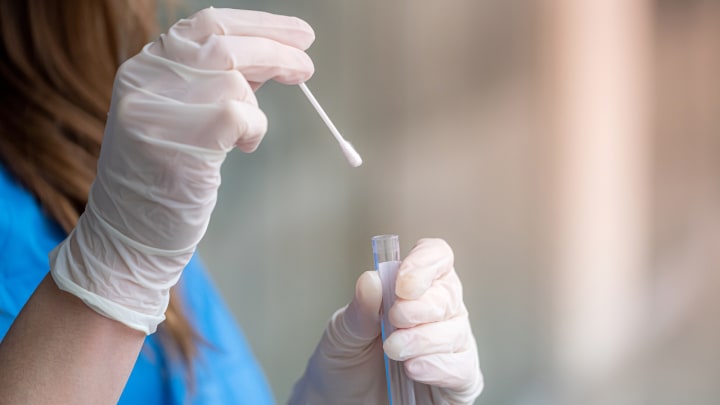Syphilis Symptoms: A Detailed Study on Syphilis Infection!
The definition of Syphilis and the "Syphilis Symptoms" in detail!

Hey folks, we are here to discuss an important topic we should know. It is none other than Syphilis. Syphilis is a Sexually Transmitted Infection caused by the bacterium Treponema pallidum. It has been a subject for centuries due to its significant impact on public health. In this article, we will discuss the definition of Syphilis and the "Syphilis Symptoms" in detail.
Let's get started.
Syphilis Symptoms: A Detailed Study on Syphilis Infection!
Syphilis Transmission:
Syphilis spreads through sexual contact with an infected Person. It can be transmitted through vaginal, oral sex, and anal.
Also, Pregnant women with Syphilis pass the infection to their unborn children. This may lead to congenital Syphilis.
Stages of Syphilis:

Syphilis advances through different stages.
They are primary, secondary, latent, and tertiary stages.
Each stage presents unique symptoms and poses different risks. Understanding these stages is vital for early detection and effective treatment.
i) Primary Syphilis Symptoms:
Here comes the first Syphilis Symptom, Primary. The first visible sign of Syphilis is usually a small sore at the site of infection. This infection is usually known as a Chancre. The Chancre is painless and may go unnoticed, leading to delayed diagnosis and unintentional transmission.
ii) Secondary Syphilis Symptoms:
During the secondary stage of Syphilis, it may embody in various ways, such as skin rashes, fever, swollen lymph nodes, sore throat, and fatigue. These symptoms can be mistaken for other illnesses. So, consult a Doctor and take a full body check-up.
iii) Latent Syphilis Symptoms:
Here comes the most important Stage, Latent Syphilis. Latent Syphilis is the hidden stage. In this stage, there is no visible symptoms are present. However, the infection remains in the body and can advance to the tertiary stage if left untreated.
iv) Tertiary Syphilis Symptoms:
The Final stage is Tertiary Syphilis. Tertiary Syphilis is the most severe stage. It has potentially life-threatening consequences. It can also damage the brain, heart, blood vessels, bones, and other organs. Neurosyphilis, a form of tertiary Syphilis, affects the nervous system. Also, it can cause various neurological symptoms.
Syphilis diagnosis:
Diagnosing Syphilis usually starts with a physical examination, during which the healthcare provider looks for visible symptoms. There, he discusses the patient's medical history, sexual history, and potential exposure to the infection.
Laboratory Tests for Syphilis Symptoms:

Laboratory tests, such as the rapid plasma reagin (RPR) test and the treponemal pallidum particle agglutination assay (TPPA), confirm Syphilis. These tests detect antibodies produced in response to the infection.
Partner Notification:
If diagnosed with Syphilis, it is important to inform sexual partners to seek testing and treatment. Partner notification helps prevent the further spread of the Syphilis infection.
Syphilis treatment:

i) Antibiotic Treatment:
Penicillin is an antibiotic used to treat Syphilis. Alternative antibiotics may be used depending on the infection stage and any Penicillin allergies.
ii) Treatment Based on Syphilis Stage:
The treatment plan may vary according to the Syphilis Stage and the severity of the Symptoms. So, early diagnosis and treatment of Syphilis significantly reduce the risk of complications.
How to prevent Syphilis:
i) Safe Sex Practices:
Practicing safe sex, including using condoms consistently and correctly, effectively reduces the risk of syphilis transmission.
ii) Regular STI Screening:
Regular screening for sexually transmitted infections is vital, particularly for individuals with multiple sexual partners.
iii) Partner Communication:
Open and honest communication with sexual partners about STI status and testing can foster a safer and healthier sexual environment.
Untreated Syphilis can have severe consequences on an individual's health. It leads to severe illness and even death.
The consequences of Untreated Syphilis:

Syphilis and HIV Co-Infection:
Syphilis can increase the risk of HIV transmission. A person with HIV may experience more severe Syphilis Symptoms. Combating both infections requires comprehensive healthcare.
Addressing the Stigma around Syphilis:
The stigma around sexually transmitted infections can delay prevention and treatment efforts. Educating the public and promoting compassion is vital to combat Syphilis stigma.
Conclusion on Syphilis Symptoms:
Syphilis remains a significant global public health concern, but its impact can be minimized with awareness, early diagnosis, and effective treatment.
Regular STI screening, practicing safe sex, and open communication are crucial in preventing syphilis transmission.
Remember, timely medical intervention can save lives and protect future generations from the devastating effects of Syphilis.
Thank you!
Thank you so much for reading this article. If you like this article, Please give a like and Support me.
Thank you once again. I'll see you in my next article.
Stay Fit and Be Happy!
About the Creator
SANTHOSH T
Fitness Enthusiast and Trainer from INDIA. I'm here to share my "key points" on Health and Fitness in a beginner-friendly language. So, Stay with me, and we all lead a healthy lifestyle together.






Comments
There are no comments for this story
Be the first to respond and start the conversation.